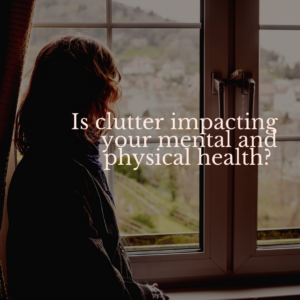Impacts of Clutter

Let’s grab a delicious beverage, sit down in a comfy chair, and chat about the general emotional, mental, and the physical impacts of clutter.
Now I know this doesn’t sound as delightful as spending your time getting puppy kisses and ice cream on a warm sunny day, but it’s an important conversation to have. Your environment(s) impact your overall well-being and this is a soapbox I will be standing on with a megaphone for many years to come, so you may as well indulge me right meow…
Now before we jump into my rundown of how evil clutter can be, if any of these points resonate with you PLEASE don’t go to a place of shame. This is all for the sake of awareness and education!
Here are some of the ways that clutter could be impacting your emotional, physical, and/or mental health.
Clutter and your physical health:
- Cluttered kitchen? Clutter is linked to weight gain; most likely because it overwhelms your brain until you make poor decisions and you may resort to eating more takeout or easy junk food choices versus something that is going to nourish you. Clutter could unknowingly be adding unwanted inches to your waistline.
- Cluttered homes contain more dust and may amplify breathing problems which can be a real concern if you have allergies or asthma.
- Dense and visually overwhelming environments can trigger a release of cortisol. The constant release of stress hormones makes it very difficult to maintain a state of wellness.
Clutter and your brain:
- A Princeton study found out the more stuff you have around you the more EACH piece of stimulation competes for neural representations, AKA, your attention. So this results in decreased performance and increased stress. For example: is your bedroom a hot mess? Your brain is taking in all those clothes hanging on the chair and papers on the nightstand as tasks that need attention. This can make it hard for your brain to calm down for a good night’s sleep.
- Some folks who reside in cluttered homes have a poorer “working memory” because the brain is in constant overload.
Clutter and your emotional health:
- A study noted that noisy crowded homes with a lack of routines may undermine children’s ability to regulate their emotions and behavior and increase moments of acting out.
- Clutter makes us anxious because we never know when we are going to get to the bottom of the pile.
- A cluttered environment can create feelings of guilt and shame.
- We deal with feelings of frustration when we can’t find things. If you start out the day late for work because you spent ten minutes looking for your keys, that frustration could set the tone for the day.
Clutter and your relationships:
- I do not need to site from any study to tell you that I see the clutter driving a wedge in-between couples and negatively impacting marriages. There are feelings of shame, blame, and complete overwhelm. It is very difficult to focus on a healthy marriage when you feel like you have an elephant sitting on your chest every time you walk through the door.
- As mentioned above when discussing emotional health, clutter can cause great issues for your children. It may make it challenging for them to regulate their emotions and this can truly add a lot of stress to the family dynamic.
- In my line of work as a professional organizer, the one very consistent thing I see in those who have cluttered homes is that they tend to isolate themselves. They avoid having gatherings and holidays at their homes out of embarrassment.
My number one goal is to help my clients create a home that is much closer to being a sanctuary than a place that could be impacting their health in a negative way. Your home is your launching pad to a productive day, a place to nourish your body, an environment where some of your most important relationships are conducted, and a place for you to rest and recharge. If your home is lacking these things, it may be worth considering if some good old clutter clearing could benefit you!
